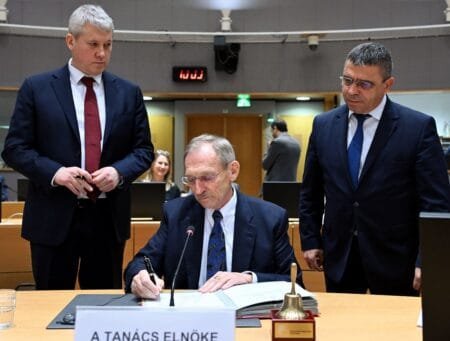112 is a telephone number that can be used to call emergency services anywhere in the European Union. As European citizens travel more and more to other countries, for business or pleasure, a single emergency number is needed. It should be the same number throughout the European Union, so that they no longer need to remember several different numbers, but only one, wherever they go. This factsheet offers answers to your questions on the 112 single emergency number.
Advertisement
As European citizens travel more and more to other countries, for business or pleasure, a single emergency number is needed. It should be the same number throughout the European Union (EU), so that they no longer need to remember several different numbers, but only one, wherever they go.
People calling 112 are connected to an operator. Depending on the national civil protection body, the operator (who may be part of the police for example) will either deal with the request directly or transfer it to another one of the emergency services (ambulance, fire brigade). In many cases, operators are able to answer in more than one language.
The Commission follows the introduction and functioning of 112 in Member States, in particular through its communication Committee, which assembles the representatives of Member State authorities responsible for electronic communications. 112 is available in all but one EU Member State. The remaining one – Bulgaria – has started taking steps to introduce 112.
According to EU legislation, EU Member States must ensure that users of any type of telephone, fixed or mobile are able to call 112 when in their country.
In addition, 112 calls must be appropriately answered and handled. Some Member States (Sweden, Denmark and The Netherlands) have introduced 112 as their sole emergency number, while in most Member States, 112 operates alongside national emergency numbers. 112 calls should be treated in the same way as calls to other national emergency numbers. The quality of the response to emergency calls should be the same, irrespective of whether 112 or a national number is used.
Member States are also obliged to make sure that emergency services are able to establish the location of the person calling 112. The ability to locate the caller in case of an emergency may be of great significance in a situation where the person is unable to state his or her location or does not know it exactly, which can be the case for calls from mobile phones.
Finally, all EU countries must inform citizens (nationals and visitors) of the existence of 112 and when they should call it.
Although EU Member States have made substantial progress in introducing 112 and making it work, they still need to improve the following areas:
– integrated emergency centres, combining ambulance, fire brigade and police, are not yet common, although they have proved to be efficient;
– the ability of operators and personnel in emergency centres to speak several languages;
– dealing with hoax calls, that account for about 60% of calls to emergency services, and pose a threat to the efficiency of the emergency response;
– in some Member States, emergency centres are still unable to determine the location of a caller;
– automatic in-vehicle emergency calls: according to an action plan agreed between the Commission and industry, all new cars should be equipped with “eCall” from 2010 onwards. This technology will call the emergency services in case of an accident, using 112 to send accident data, including the car’s location. Many Member States need to upgrade their infrastructure to enable the emergency services to receive and process the eCall data;
– information to citizens: although awareness of 112 has risen in the EU over the past few years, the Commission believes that there is still room for improvement.
The Commission will continue to play an active role in promoting 112, and will take legal action if necessary. However, the responsibility for the organisation of the emergency services and the response to 112 and national emergency
numbers rests with the Member States.
To encourage and help EU Member States to ensure that 112 works satisfactorily across the EU, the Commission regularly exchanges views with the Member States in the framework of the Communications Committee and outlines best practices in implementing 112.
The Commission has also set up a specialised body, the Expert Group on Emergency Access, consisting of Member State officials representing emergency response centres, civil protection and telecommunication authorities.
This expert group seeks practical solutions to problems experienced by the emergency services at local, regional or national levels, and deals with issues related to the application of new technologies for communication with
emergency services.






